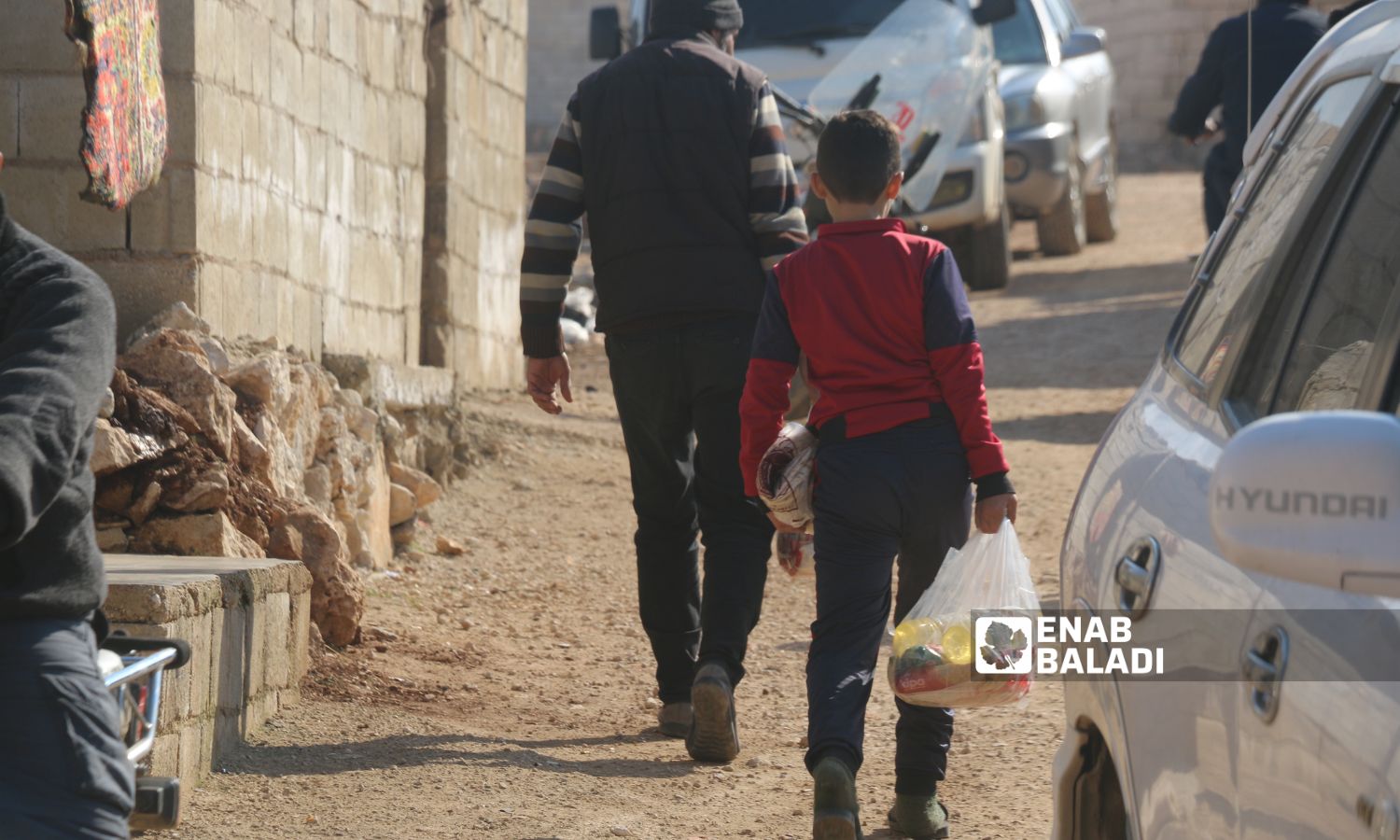



Enab Baladi – Idlib
The World Food Program’s (WFP) move to cut food and cash-for-food assistance for nearly half of the 5.5 million people in Syria, from July, due to fast-depleting funds, has caused widespread concern and fear among the displaced in northwestern Syria.
The beneficiaries of the program fear that their entitlements of food and relief baskets that they receive monthly from international partner organizations of the World Food Program will stop.
The WFP move on June 13 was a last resort that will harshly impact up to 2.5 million people dependent on what are already half-rations on which they can barely survive.
In Syria, WFP urgently requires a minimum of US$180 million to avert cuts and continue providing food assistance at its current level until the end of the year.
“Instead of scaling up or even keeping pace with increasing needs, we’re facing the bleak scenario of taking assistance away from people right when they need it the most,” says WFP Representative and Country Director in Syria, Kenn Crossley.
He added that “Further reductions in ration size are impossible. Our only solution is to reduce the number of recipients. The people we serve have endured the ravages of conflict, fleeing their homes, losing family members and their livelihoods. Without our assistance, their hardships will only intensify”.
Yahya Naqouh, 42, expressed to Enab Baladi his concern about what might happen if the aid of the food basket that reaches him stops, saying, “This basket is very important to us, and despite its contents that have diminished over the months, it still covers basic needs.”
He added that many of the displaced depend on the food basket aid as daily sustenance, as job opportunities are “scarce,” the unemployment rate is high, and the income is almost non-existent, as he described it.
Regarding the lack of alternatives, Naqouh indicated that before the decision to stop aid came into force, he saw many people currently searching in garbage dumps for something to eat, wondering what condition the needy people will reach after the implementation of the decision.
For his part, Mohammad al-Khair, one of the beneficiaries of the food support program, told Enab Baladi, “The basket is very important, and it fills a big gap for me and for any family in the camps.”
Al-Khair, who is a daily worker in Idlib countryside, intends to object and protest against the decision if his name is removed from the list of beneficiaries and to meet the officials concerned with the decision, he said.
The daily wages range between 30 and 60 Turkish liras, according to the number of working hours and the profession, such as construction, agriculture, and loading of goods.
With the high prices of most materials and products in the markets, there has been no change in the wages of workers in Idlib, especially with the abundance of labor and the decline in job opportunities. The wages of a worker do not exceed, at best, 70 Turkish liras (less than $4).
4.5 million people live in northwest Syria, of which 4.1 million are in need of assistance, and 3.3 million are food insecure.
While the number of displaced people in the region out of the total population is 2.9 million people, of whom 1.9 million live in camps, according to the United Nations.
Enab Baladi contacted the Humanitarian Affairs Directorate of the Syrian Salvation Government (SSG) in the city of Idlib to ask about the proposed solutions in light of the implementation of the decision to cut food rations by the WFP.
The director of the Humanitarian Affairs Directorate in the Salvation Government, Tariq al-Ali, told Enab Baladi that the Ministry of Development and Humanitarian Affairs “is developing solutions to compensate for the shortage that will affect our displaced people, such as communicating with international organizations and humanitarian action partners to fill the shortage.”
Al-Ali added that the decision will include large numbers of people in camps, villages, and towns, and if it is implemented, the criteria will change so that food support will be distributed to the most needy segments, which means that “large” numbers will be removed from the aid lists.
Jamal al-Najjar, the communications officer of the World Food Program in Syria, said in a previous interview with Enab Baladi, “The WFP and its partners on the ground carry out a regular assessment of families, as they review families’ eligibility to receive assistance based on need.”
The WFP also uses available need data to identify those most in need of food assistance, according to al-Najjar.
The Food Programme will not be able to provide any compensation to people who will be excluded from receiving food aid, in the absence of any alternative plans, in the event that the expected level of funding support is not reached.
The WFP counted on the pledges of the seventh Brussels Conference on “Supporting the Future of Syria and the Region,” which aims to mobilize funds for Syrians in need of aid and for neighboring countries hosting refugees.
The International donors on June 15 pledged 5.6 billion euros ($6.13 billion) at an EU-hosted conference in Brussels.
The pledges include 4.6 billion euros for 2023 and one billion for 2024 and beyond to support people inside Syria and neighboring countries hosting Syrian refugees, according to Reuters.
The Syrian Response Coordination Group (SRCG), which is concerned with humanitarian affairs in northwestern Syria, warned in a statement of measures to remove more than 2.5 million beneficiaries in Syria from food aid in the event of not obtaining sufficient funding after the program deficit reached 98.9%.
The program will increase the time period for providing aid from one month to more than 40 days in the event that the deficit continues to finance its operations during the coming period, according to the statement.
if you think the article contain wrong information or you have additional details Send Correction